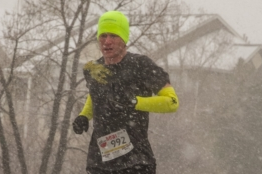Last Saturday, feeling frustrated at not running well on the treadmill, I decided to put mind over matter and turn in an excellent time on a six-mile run on it. Matter won. In the immediate post-run reflection, I came to a very simple conclusion: I just don’t run as well indoors, and this has always been true. I have many memories of indoor track. Most of them are that I didn’t enjoy it as much as running outdoors.
Many athletes struggle in venues for various reasons. The following two have more accolades and championships to their credit than me, but I use them because they should be familiar to even the most casual sports fan and it illustrates that sometimes, things just don’t work the way you want in athletics.
For all of Roger Federer’s dominance on the tennis court, including twenty grand slam titles, he has repeatedly struggled at the French Open. He does have a championship there, but given his higher rate of success in all other tournaments, that one has proved more elusive.
In the early 2000s, USC football steamrolled past almost all of their opponents, including the best teams they faced. And yet, they lost twice in a row to Oregon State when they played them in Corvallis. This was a team that had no business hanging with the Trojans, yet they ran right past them. Something in the Corvallis water or atmosphere did not mesh well with USC.
There are running examples of this phenomenon, not necessarily with location but with types of events. Kipchoge has dominated the marathon in various locations in an unprecedented way. His track record is not shabby by any means, but if you look at it next to his marathon record, it’s not even close. Bekele dominated the 5000M and 10000M for years. While he has had some top-notch performances in the marathon, he has also been inconsistent and will not be considered a titan of that distance.
I’ve stated that I’m happy with a pair of running shoes on my feet and solid ground underneath them. Yet, I don’t run as well indoors. It’s strange. It’s the same motion, I have the same capability in my legs, but something just doesn’t work the same way.
No competitive person wants to admit that they just don’t do as well in certain conditions or at certain venues. And, there is value in continuing to chip away at a challenge to make ourselves better. Yet, it appears that even for the best athletes or programs, there are times when it may be valuable to evaluate whether they should continue to go after something they’re not meant to do, or try something different. Roger Federer and USC don’t have much choice over their schedules so their adaptive technique needs to be different.
As runners, we have the luxury of pivoting to new things. What if Kipchoge had continued to try and find more success at the 5000M and 10000M? He might very well be another good track runner with a couple of Olympic medals and respectable times, hardly known by anyone outside of the die-hard running community. What about Bekele? His progression was different, but had he continued to push at the 5000M and 10000M distance, would he have had a couple of more titles and medals to his name? Possibly. I’m sure there are plenty of lesser-known runners who wanted to run lights out on the track but eventually realized that they probably were destined to be a marathoner, or ultrarunner. Did they shrink away from a challenge, or did they become more aware of their strength and weaknesses and react accordingly? Thank goodness for the ability to pivot.
There are many things that I love about the treadmill, both from a practical and a training standpoint, and I’ll still be on it quite a bit. But as far as running inside, I won’t be seeking out any all-comers indoor track meets any time soon. I’m running with the idea (pun intended) that I have a better understanding of my strengths, and that turning in top-notch times indoors is not something that needs to be reconciled.

Running anecdotes, running food reviews, some race coverage, and more